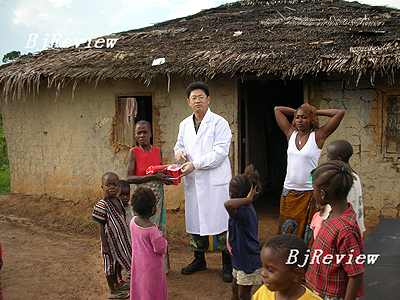
"That experience is too deep for me to forget," Hao Tianzhi, an orthopedic surgeon with the Chinese PLA (People's Liberation Army) General Hospital of Beijing Military Area recalled of his eight months as a peacekeeper in Liberia.
Hao took the international peacekeeping mission in March 2006. His medical team included 43 persons, most of whom were with the peace troops for the first time and none of whom had been to Africa before.
"To be honest, we were a little nervous in the beginning as the civil war in that country was not finished and tropical diseases were rampant," he said.
Hao took a 40-day training course before going to Africa. The training included building up body strength, dealing with tropical diseases and AIDS, escape skills, language and international law.
For the first time in his life Hao experienced the traumas caused by war when he landed in Liberia. It still makes his heart race a little when he recalls the telegraph poles pitted with bullet holes, and the social instability he saw around him.
The early days in a strange country were tough for him. The tropical weather was hard to get accustomed to and there was often insufficient supply of vegetables due to interrupted traffic as a result of the war.
"Gunshots could be heard from time to time even though the civil war was basically over, and there was always the lack of a sense of safety," said Hao. On occasion local people would take out their anger and frustrations on the Chinese camp, gathering in front of it to throw stones at the troops.
Hao and his fellow Chinese peacekeeping troops devoted themselves to work the minute they set foot in Liberia. The main task for the medical team was to maintain the health of the international peacekeeping force, but it also helped many local people.
On one August day in 2006, Hao was about to have a good sleep after working the night shift when he received a call saying that a 9-year-old child was badly burned and needed medical treatment at once.
Hao was stunned when he saw the injured child though he had seen a lot as a veteran surgeon. The crying child looked much younger than his real age as a result of malnutrition and was covered in blood and pus. He was in such a critical condition that he could have died soon without the right treatment. In addition it was quite possible the boy was an HIV carrier, and his body secretion was infectious.
Hao's responsibility as a doctor and love of children over-rid all the risks and fear. The child received careful surgery, survived and was returned home.
Several days later when the child failed to return for a check-up on his condition Hao and the other medical staffers began to worry about him, so Hao decided to go to the boy's home. He led several medical teammates to the child's home through twisted narrow paths covered with mud and it turned out that the boy was in good condition, so the medical team left some medicine and nutrients.
"To make a house call was not within our responsibilities because of safety concerns, so the family members of the sick child were so excited when we showed up at their gate that his grandmother hugged every one of us," said Hao.
The work in Liberia was much more difficult than in China, according to Hao. He had to stand watch during the night besides his normal duties as a doctor.
But there were some comforts, including a notebook computer that was allocated to every member of the team before they hit the road for the African country. Hao used the computer to write a diary, surf the Internet and store many of the pictures he took.
Hao never paid a visit home during his stay in Africa and later felt guilty about it as some of his family members fell ill but chose to conceal it from him, in order not to affect his emotions abroad.
Returning home from Africa, Hao now takes a different attitude toward his life, which he had previously thought was too plain. Now in his eyes, health and security are the two things that should be most cherished in life. | 